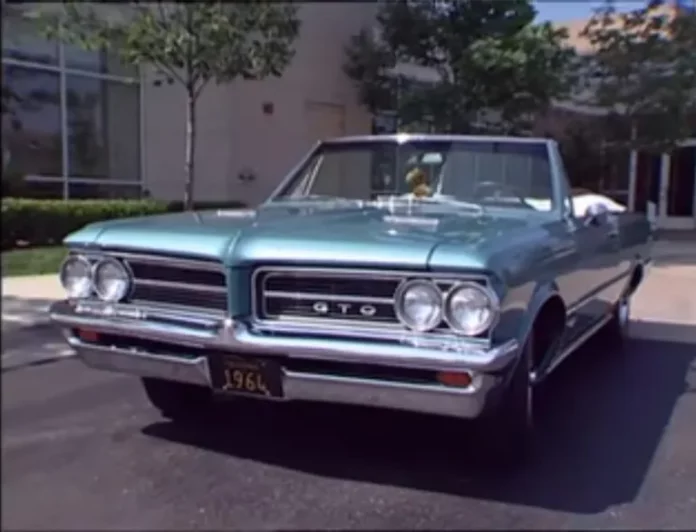A Pontiac GTO Documentary Video Transcript:
0:01 Narrator: In the 1950s Pontiac was facing a crisis. it had to change or vanish its cars were dull and something new was needed now. They decided to make good-looking affordable cars that went fast. This simple idea saved Pontiac and spurred the development of one of the great automotive icons. The GTO.
0:59 A new GTO hit the streets in 2004. 30 years of the original faded away. The reintroduction of America’s first Muscle Car gave fans something to celebrate. At the 2004 GTO National Convention. To welcome the new GTO, the organizers set this year’s event in the center of GTO country, Pontiac Michigan. Pontiac was a spawning ground of the first GTO.
1:45 Over 1,000 people made the journey to share stories, look at one another’s cars, and soak up the legend of the GTO. They discovered it had its roots in post-war America. The American economy took off after World War two Pent-up demand, abundant jobs, and the money people had saved during the war triggered enormous sales for carmakers.
2:21 Under the guise of national defense President Eisenhower pushed through the creation of an interstate highway system. these new roads fueled the growth of suburbs and transformed Americans into commuters. Suburbanites loved their cars. They started spending more and more time on the road. the car makers had finally retooled after the war and were now turning out an endless array of new cars.
2:53 The competition got tougher and tougher. Jim Wangers an account executive for Pontiac’s advertising agency had an insider’s view.
3:01 Jim Wangers (president AMCI): The car shortage had kind of been diminished after World War two and you know during that immediate post-war era everybody would drive whatever they could get their hands on. But by now the market had been fulfilled and people became more selective.
3:22 Narrator: Wangers found out that Pontiac was in trouble, its cars were boring, reliable, but dull.
3:27 Jim Wangers (president AMCI): Reality was that it was a nice car and by now this was the mid-50s, you couldn’t sell a nice car.
3:40 Narrator: General Motor’s other divisions Chevrolet, Buick, Oldsmobile, and Cadillac was zooming ahead but Pontiac was stuck. its future was at stake.
3:53 Jim Wangers (president AMCI): it was actually the mid-50s that ultimately led General Motors to the conclusion that this division needed a major change. Not only in its product development but in the way in which the car was imaged, and in the car was marketed.
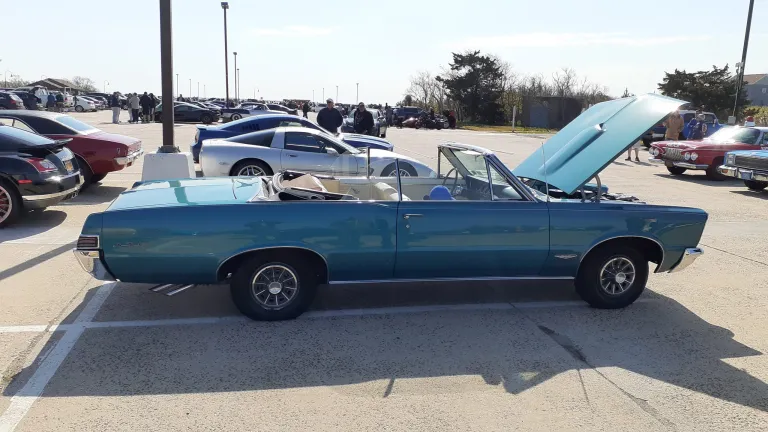
4:13 Narrator: GM executives began to think about killing off Pontiac. but GM’s president Paulo Curtis wanted to rescue it he knew just the right person for the job the son of a former GM president Bunkie Knudsen. When Bunkie took over Pontiac in July of 1956, he was sure he could transform it, he just wasn’t sure how.
4:49 Jim Wangers (president AMCI): Oldsmobile had a pretty good name for luxury, and nice comfortable size. Chevrolet which had a pretty good name for good quality entry-level low-priced merchandise. Were squeezed in Pontiac from both top, and bottom and Pontiac had nothing to offer. Except for just another nice car.
5:09 Narrator: Knudsen did a little polling. He asked his kids what they thought of Pontiacs. They politely told him; he had a lot of work to do. His son was only 15 but Knudsen knew that Pontiac had to appeal to the kids his age. They were part of the baby boomers who would change everything ignore them at your peril.
5:32 Jim Wangers (president AMCI): That was the stroke of genius, that was the one thing that Pontiac saw. The management team at Pontiac and I like to think that I was kind of part of a contributing factor. We saw what was going to become the greatest market segment ever to hit this country. Which was the group we now call the baby boomers.
5:52 Narrator: Knudsen felt the boomers would respond to good-looking affordable cars that had real performance fortunately Pontiac had a strong V8. One way to get attention was to win some races. Nobody believed that these stodgy cars could win but Knudsen was determined to try.
6:17 Jim Wangers (president AMCI): Well, they made up their mind that Grandma which is what laughing we called it. The nice tire you know that was built to last 100,000 miles. Conservatively styled, conservatively powered they decided that they were going to turn grandma into a teenager.
6:40 Narrator: Knutson launched an assault on Florida’s Daytona speed week and race in February of 1957. he hoped this would serve notice, that Pontiac was changing.
6:52 Jim Wangers (president AMCI): Monte was a car guy, he understood performance. He understood young people, he understood performance cars, he understood that racing at that point was a very important thing to help build images.
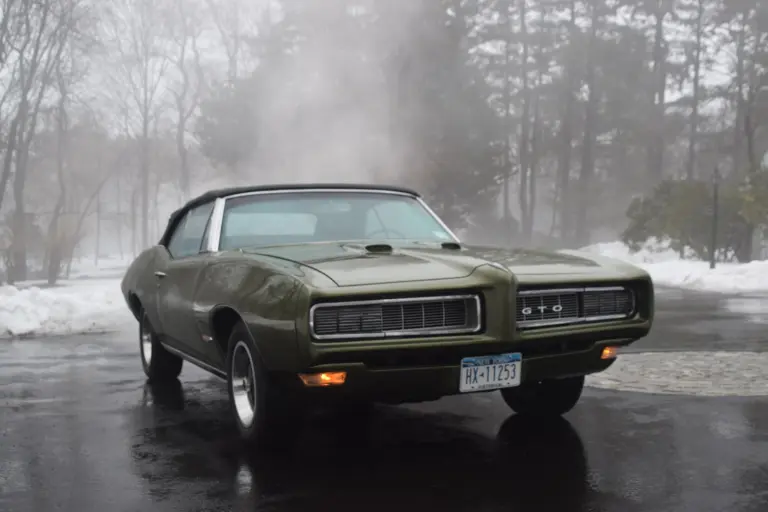
7:11 Narrator: Knudsen’s team turned up the sand and started to break records. one car clocked in at 141.2 miles per hour the fastest time ever for an American car in its class. The speed tests and qualifying heats on the beach were just a warm-up for the main event, the Daytona 500. At the time this Raggett contest was run on an oval course carved out of the beach and a scrub brush.
7:51 Knudsen’s cars were pitted against experienced teams from Ford Chrysler and Chevrolet. No one believed Pontiac had a chance. But lap after lap they showed they could compete, they kept fighting. By the finish Cotton Owens, a Pontiac driver flew across the finish line and captured a win.
8:22 The gods had smiled on Pontiac. Knudsen and Pontiac were on their way. To keep building Pontiac’s image. he assembled a team that shared his passion for performance. he poached Pete Estes from Oldsmobile and snapped up a young engineer from the remains of Packard. John DeLorean.
8:49 DeLorean was a little wild, but he was the best engineer Knudsen had ever met and he knew what young people wanted. This dream team started building cars to ride the coming wave of baby boomers.
9:11 Jim Wangers (president AMCI): While in the late 50s most of those baby boomers were kids. They were 10 11 maybe 12 years old, they were just now coming into their own as an entity. And Pontiac was the first one to kind of recognize this. Because Mr. Knudsen himself understood it as a manager and as a marketer.
9:38 Narrator: The first effort hit the streets in 1959 the new long, low, and wide look became known as the Wide-Track.
9:50 Jim Wangers (president AMCI): One of the most significant things about it is, you could look at that car, and immediately see that it had that wider tread. it was almost kind of a selling message of its own. you looked at the car and say oh yeah there is one of those wide-track Pontiacs.
10:10 Narrator: The new look and racing success gave Pontiac the boost it needed. It jumped from sixth to fourth place in sales. Knudsen was rewarded with the top job at Chevrolet, but his team stayed to finish the work at Pontiac. By 1962 they nocked Rambler out of third place and were in line just behind Chevrolet and Ford.
10:36 They were going strong then the corporation dropped a bombshell. A ban on racing it was an era when racing deaths were increasingly common. the big three auto companies did not want the bad publicity associated with sponsoring something dangerous. They also feared that the public would pressure the government to add costly safety features to their passenger cars. The easy route. quit racing.
11:26 This was a death sentence to Pontiac. But DeLorean had an idea. He liked the power of Pontiacs large 389 cubic inch engines and thought these big powerplants would be great in a smaller car.
11:41 Jim Wangers (president AMCI): In other words, take the biggest engine and stuff it into the smallest chassis. Which is a trick the hotrod community had been doing for years. Well, Pontiac decided to do it as a manufacturer.
11:54 Narrator: It was more than GM’s anti-racing rules allowed. But he snuck it past them and had a hot new car to launch in 1964. He called it the GTO. It was a stealthy introduction, no fanfare but the dealers knew what DeLorean was doing. And they quickly ordered 5,000 GTOs. The muscle-car era had begun.
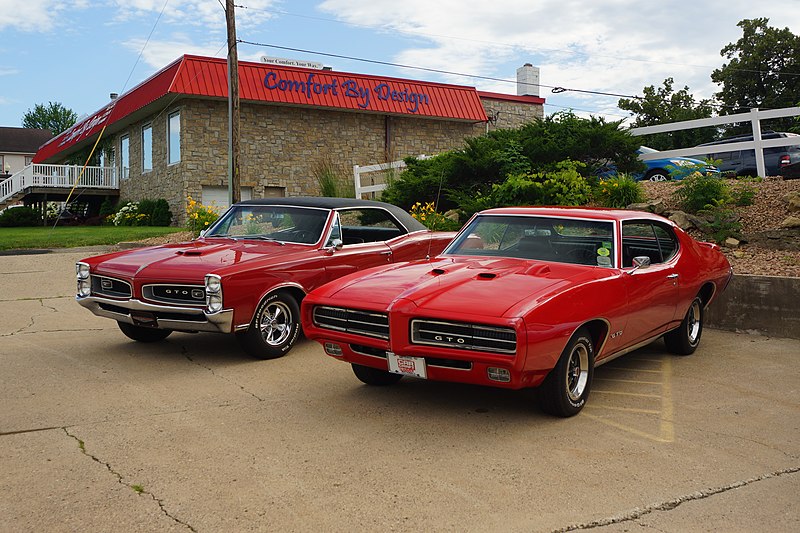
12:30 Jim Wangers (president AMCI): The car was at the right place at the right time the GTO. And of course, when it hit the marketplace, it was an overnight smash.
12:40 Narrator: People liked the lack of Chrome, its aggressive stance, and most of all its blistering performance. it had a list of options that allowed a buyer to gear toward speed or more luxury cruising. DeLorean wanted something that was part BMW and part hot rod. Young American drivers were not looking for a European road car they wanted something that was fast and good-looking. The perfect cruising machine.
13:16 Jim Wangers (president AMCI): And the Pontiac GTO was the absolute teenager’s dream. because it was a $2,500 car that could sit there and kind of thumb its nose at just about anybody out there. Cars costing twice as much.
13:32 Narrator: By 1965 it was a major success. Sales had jumped from 30,000 in 1964 to 75,000 by the end of the year. DeLorean rode the GTO to the top he was named at Pontiac’s general manager. Pontiac sored with the GTO’s success it touched the nerve of the growing cruising scene. GTOs started to dominate Detroit’s Woodward Avenue. The epicenter of the area’s growing performance car culture.
14:19 But the GTO did not have the turf to itself. Chrysler Ford and Chevrolet introduced cars to compete. While challenged DeLorean’s GTO still ruled Woodward Avenue and its meeting grounds “the drive-in”.
14:36 Jim Wangers (president AMCI): This was a very, very, famous drive-in site. The name of the drive-in was the Totem Pole. And used to be a real serious hangout for most of the young folks were out cruising, looking for girls as well as a race. Which they could almost always find.
14:59 Larry Payne: It was really quite a thing with the drive-ins. Everybody pulled into the drive-in, you’d line up to get in to get a spot, and you would chip in the money. A Coke was 15 cents, hotdogs were 50 cents, were 45 cents, and you would usually share one because you didn’t have enough money. Because you had to buy gasoline, it was 18.9 during the gas wars.
15:30 Narrator: Almost every night over 2,000 street races would come out. These baby boomers love their hot cars and wanted to see what they could do. Four-on-the-floor, three-duces, and the 389 meant Pontiacs and cruising Woodward.
15:49 Detroit’s Woodward Avenue was and still is perfectly suited for cruising. But fueled by a heavy mix of burgers, fries, and cokes. Blended with raging hormones and stirred by performance cars. Young people engaged in a high-test mating ritual on streets all over the country.
16:12 Larry Payne: Well, we would wait there for a certain person to come through. We wanted to go race, and then we would follow them out, and go line up on the next traffic light. As many as four abreast and have at it. It was the car culture, the competition, bragging rights, was so important of who beat who, because it lasted forever.
16:38 Narrator: DeLorean’s engineers, designers, and executives also got into the act. They leave work and head down to Woodward to see how their cars fared against the regulars.
16:53 Larry Payne: We had very famous names coming out here, John DeLorean, George DeLorean very famous names that all started out here I Woodward Avenue.
17:06 Narrator: To keep the GTO on top Pontiac’s engineers used what they learned on Woodward to develop performance enhancements that dealers could sell. GTO’s racing was not confined to the streets, even though Pontiac couldn’t officially sponsor racing. They help drivers take their cars to drag strips. The cars performed and helped to spread the word that the GTO was hot. Fans have preserved many of these winning Pontiacs and still take them out to show just how amazing they were.
17:53 In 1969 DeLorean was given the top job at GM’s largest edition Chevrolet. His replacement Jim McDonald didn’t have the same passion for performance or feel to what young people wanted. The GTO was still a winner, but times were changing. The new GTO Judge inspired by a comedy bit from a popular television variety show was feeling the competition. Pontiacs line up started to lose its grip on the marketplace.
18:36 Plymouth muscled in on their third-place roost it was clear that the 70s were going to be a tough race. The 1970s were a challenging decade for America’s performance cars. Government-mandated reductions in leaded fuels made automakers lower engine compression ratios. Power dropped. Other emission controls sapped more power, and then fuel economy standards prompted by gas shortages took the muscle out of the muscle cars. Then the police started to target the cruisers on Woodward. It was a hard time.
19:21 Larry Payne: They eventually put signs up that said no cruising through drive-ins, and if you went through and didn’t buy an item like a Coca-Cola, you’d get a ticket and so that was the beginning to the end of the driver-ins.
19:35 Pontiac GTO Documentary Narrator: By 1974 the GTO also was history. Gone but not forgotten. Fans kept them restored them took them out for cruisers and even passed them down. These were cars that memories were made of.
19:57 Darwin Ludi: I originally purchased the GTO in 1965. I met my wife when I had one of these and I just kind of reflect on all the things that I did back in those days. I found this up in Sacramento, and just started from there. I started rebuilding it and the thrill is never gone.
20:16 Narrator: No one thought that GTO would return. But GM’s Australian subsidiary Holden was building a high-performance car that caught Detroit’s eye. After some modifications, this car was brought to the States and launched as the new GTO. GTO loyalists were somewhat miffed because they thought their ideas about the new GTO were ignored by GM. Many didn’t like the cars looks. The 40th anniversary was the first time that most would get a chance to actually see one in person, and see I perform.
21:03 Pontiac tapped a noted rally driver Rhys Millen to take the unconvinced for a test drive. He showed how the GTO handled the new sport of drifting.
21:18 Rhys Millen (Rally Driver): Usually when people hop out of the car, they really don’t have much to say. But scream and holler, you know. it’s another thing to watch from the outside, but as you got to experience to sit in the passenger seat. You know, you see the cones coming or the barriers out there, and it looks like you’re gonna slide right into them. But your judgment of distance and speed is so precise that you can run right up and touch a cone or touch a barrier and still be in control. so it’s dynamic, it works, and it’s exciting sitting here or watching it.
21:55 Narrator: While it wasn’t a classic Cruiser, the riders couldn’t deny its power and agility.
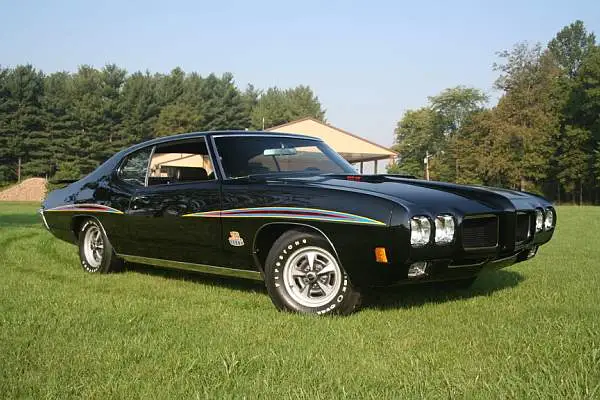
22:02 Spectators: I’m impressed you’re gonna sell a ton of them probably. Big fun, got the ride of my life, get back in line.
22:10 Narrator: Even drag racing legend Arnie Beswick who won the first NHRA championship in 1953 and later survived a near-fatal racing fire. couldn’t believe how the car performs.
22:33 Arnie Beswick (Drag Racing Champion): it’s a fun, fun, car. I could forget the styling, I might not like all that well. because of the performance, this carb is just, it’s just breathtaking.
22:54 Kip Wasenko (co-director GM): But I’ll tell you what when you get that big up like over 4000, wow.
22:57 Kip Wasenko co-director of GM’s performance division styling department. Assembled a team to create a new vision for the GTO, in time for the 2004 Woodward Dream Cruise.
23:11 Kip Wasenko (co-director GM): But We have listened to what people have said. So, we’ve digested and taken those words to heart. I think we’ve addressed the car to give it more muscle, much more presence. But it’s still true to what a GTO is.
23:27 Narrator: Wasenko’s team members had deep feelings about the GTO. They wanted to make sure they got it right, this time.
23:43 Mark Hentrich (Designer): When I was seventeen-year-old my mother went out and bought a brand new 1965 GTO. That was a car that people took notice of. Well, the GTO today this they’ll take notice of. This is got the stance, it’s a little more of futuristic, it’s got the Heritage to it. That’s what I like about it.
24:06 Narrator: The classic GTOs have been making us feel good for years. it looks like a GTO will once again provide a new generation with the excitement of high-performance thrills. The glory days of the muscle-car era can’t be recreated but they’ll never be forgotten.
